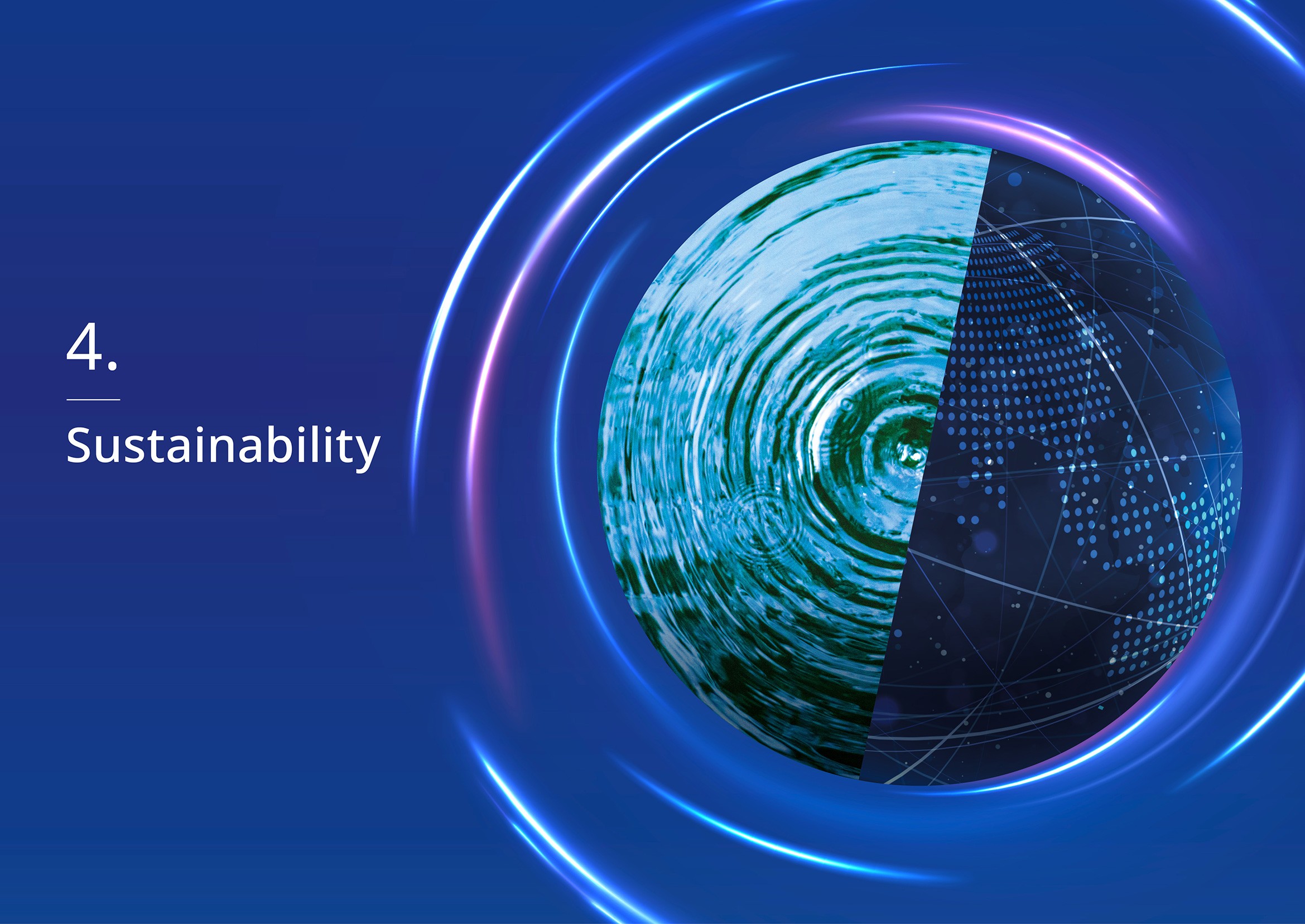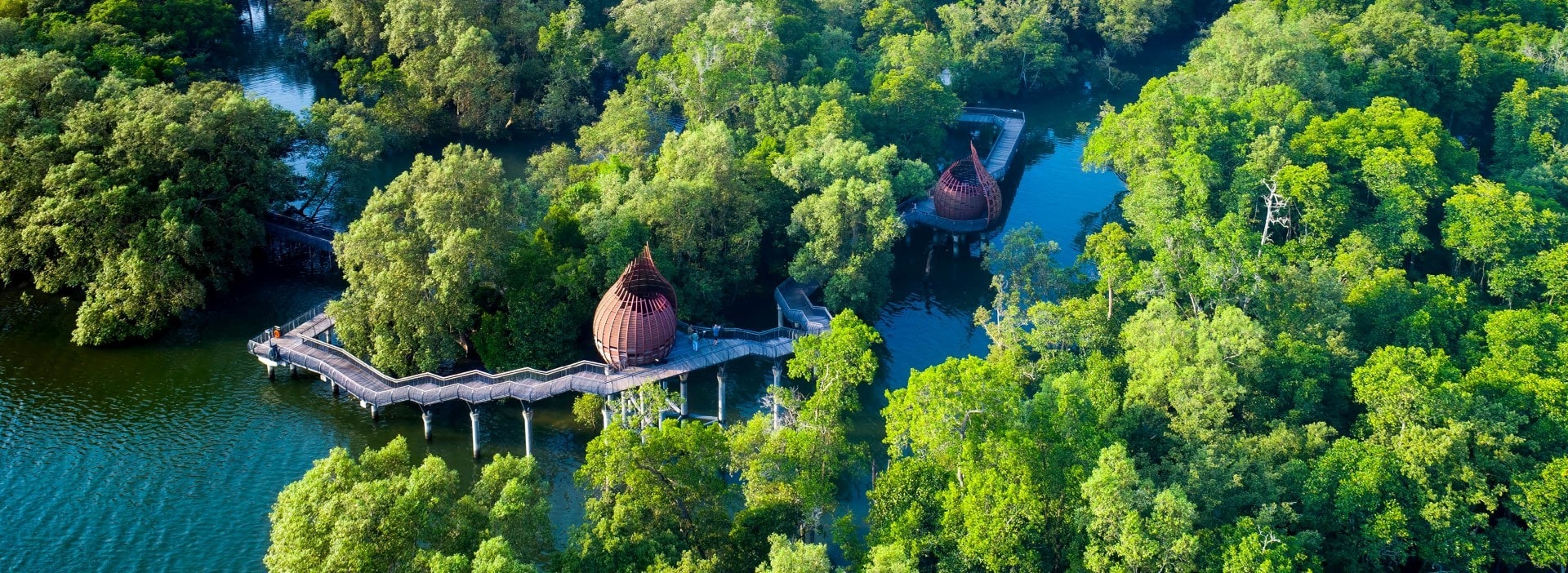Sustainability
We remain unwavering in our commitment to sustainability, as an integral part of building a thriving and resilient portfolio.
Sustainability is at the core of everything we do — from our mandate to deliver sustainable returns over the long term, to our strategy of how we operate as an institution, shape our portfolio, and engage our portfolio companies to build sustainable businesses.
Amidst today’s macro uncertainties and geopolitical developments, we remain steadfast in our efforts. These include investing into companies that are aligned with the Sustainable Living structural trend; supporting partnerships and platforms that enable positive climate impact; and engaging our portfolio companies on decarbonisation.
Find out more about our sustainability strategy
Find out more about our approach to sustainability governance
Sustainability Milestones
One key milestone over the year was the allocation of S$100 million from our community gifts as Concessional Capital for Climate Action (CCCA), in conjunction with Temasek’s 50th anniversary. With Asia requiring more concerted efforts in scaling climate finance, CCCA will complement our ongoing efforts to deploy commercial capital, providing more flexible, patient, and favourable financing for climate action initiatives in the region. It aims to crowd in other forms of capital to support marginally bankable opportunities.
We continued to collaborate with our wider ecosystem to advance innovative financing solutions to support a just and inclusive climate transition in emerging markets and developing economies.
Our collaboration with the Monetary Authority of Singapore on the Green Investments Partnership (GIP) saw the appointment of Pentagreen Capital, Temasek’s debt financing joint venture with HSBC, as the manager for GIP. Pentagreen Capital will manage and deploy capital to marginally bankable green and sustainable infrastructure projects in Asia, in sectors such as renewable energy and storage, electric vehicle infrastructure, sustainable transport, and water and waste management.
Through our Sustainability Report, we have also enhanced our disclosures, taking into consideration the disclosure requirements issued by the International Sustainability Standards Board.
As an investor and owner, we work with our portfolio companies to contribute towards real-world decarbonisation.
Sustainable Living, one of the four structural trends that guides our portfolio construction, is a megatrend which has pervasive impact across all sectors and business models. We continue to deploy capital towards net zero, nature positive, and inclusive growth.
During the year, we invested S$4 billion in line with the Sustainable Living trend. We focused on differentiated technologies with competitive advantages and geopolitical resilience. We also leveraged public market dislocations to take companies private, and invested in the sustainable infrastructure space.
As at 31 March 2025, our portfolio value of investments aligned with the trend was S$46 billion16.
Pathways Towards Our Climate Targets
Our target is to reduce the net carbon emissions attributable to our portfolio to half of its 2010 levels by 2030, with the ambition to achieve net zero by 2050. In recent years, we have made significant progress on decarbonising our portfolio, driven by the efforts of our portfolio companies, as well as our internal carbon price which embeds the cost of carbon in our investment decisions. Nonetheless, we recognise that our targets remain challenging given the concentration of portfolio emissions from companies in hard-to-abate sectors. The solutions to drive the significant emissions reductions required in these sectors have yet to be commercialised and scaled.
We remain focused on three pathways:
Investing for a Low-Carbon Economy
Encouraging Decarbonisation Efforts in our Portfolio Companies
Enabling Carbon Markets Solutions
Find out more about these pathways here
Emissions Associated with Our Portfolio
We have been disclosing the carbon emissions attributable to our investment portfolio as part of our annual reporting, and are tracking the progress towards our climate targets.
The reported Total Portfolio Emissions17 encompass 77%18 of the portfolio as at 31 March 2025.
Total Portfolio Emissions remained at 21 million tonnes of carbon dioxide equivalent (tCO2e) for the financial year ended 31 March 2025.
Portfolio Weighted Average Carbon Intensity19 also remained at 92 tCO2e/S$M revenue for the financial year ended 31 March 2025.
On the other hand, Portfolio Carbon Intensity20 decreased to 63 tCO2e/S$M portfolio value, from 73 tCO2e/S$M portfolio value for the previous financial year.
This year, we provided an additional lens on our Total Portfolio Emissions by reflecting emissions attributable to Singapore Airlines (SIA) separately. This is in recognition that the hard-to-abate aviation sector is committed to the Carbon Offsetting and Reduction Scheme for International Aviation’s baseline requirements, and hence follows a different decarbonisation trajectory from the rest of the portfolio.
(for year ending 31 March)
Towards Net Zero
-
Total Portfolio Emissions3 (ex SIA)
-
Emissions attributable to SIA
-
Total Portfolio Emissions (Illustrative)
-
Negative Emissions4 (Illustrative)
-
Pathway for Net Portfolio Emissions (Illustrative)
-
Calendar year emissions data and targets are reported in the subsequent financial year
1 tCO2e refers to tonnes of carbon dioxide equivalent, a standard unit of measurement used in greenhouse gas emissions accounting and reporting.
2 2021 figures have been restated to reflect updated emissions data (Scope 1 and Scope 2) from some of our portfolio companies.
3 Total Portfolio Emissions reflect the absolute emissions (Scope 1 and Scope 2) associated with our investment portfolio, expressed in tCO2e. Our investment positions in private equity funds, credit, and other assets are excluded.
4 Negative emissions acquired through investments and high-quality carbon offsets.
Find a more detailed breakdown of our portfolio metrics and targets
Engagement with Portfolio Companies on ESG Practices
This year, our engagements focused on understanding the progress our major portfolio companies have made on their decarbonisation pathways and climate transition plans.
For the financial year ended 31 March 2025, we engaged 17 major portfolio companies representing 91% of Total Portfolio Emissions, and 14 of them have set targets to achieve net zero by 2050.
Beyond engaging with portfolio companies on their climate transition readiness and their broader Environmental, Social and Governance (ESG) practices, we worked with select portfolio companies on opportunities to drive value creation through our ESG value creation playbook.
Find out more about how we engage our portfolio companies on sustainability
Advancing Sustainability Through Investment Partnerships
The transition towards a more sustainable future is becoming increasingly complex, and demands a concerted, multi-stakeholder approach towards financing and unlocking impact.
Across the year, we invested alongside partners to accelerate and scale the deployment of capital into critical areas required for the energy transition. These include core-plus infrastructure opportunities in more mature energy assets that yield stable, long-term cash flows, and are also focused on scaling sustainable solutions.
For example, we partnered Brookfield to acquire Neoen, a fully integrated renewables development platform, and for Brookfield's Catalytic Transition Fund to invest in clean energy and transition assets; as well as Energy Capital Partners to acquire Atlantica Sustainable Infrastructure, a clean energy transition company focused on renewable energy.
Find out more about other Sustainable Living investments we made this year
We continue to forge partnerships to build capabilities, scale sustainable solutions, and drive systemic change to accelerate the climate transition.
Against a volatile backdrop, collaboration remains key. Our valued partnerships and the collective strength of our networks have been vital in catalysing and scaling positive impact.
Enabling Sustainability Innovations in the Region
Asia hosts more than half of the world’s population and contributes more than half of global carbon emissions. New technologies are required to address the region’s unique decarbonisation challenges, and more needs to be done to cultivate talent and develop capabilities in climate science and innovation.
Our efforts to foster a pipeline of potentially scalable innovations are multifold. Alongside partners, we have established initiatives that are building up capabilities and nurturing a steady stream of talent, including:
- Singapore Climate Ventures, a venture exploration education programme to drive climate tech innovation, established in collaboration with Singapore’s Nanyang Technological University and the National University of Singapore, and with support from Breakthrough Energy, the climate organisation founded by Bill Gates
- Breakthrough Energy Fellows – Southeast Asia, a tripartite Fellows programme set up alongside Breakthrough Energy and Enterprise Singapore, which has supported its first cohort of climate researchers and innovators through funding, mentorship, and networking opportunities
- Centre for Hydrogen Innovations, a research institute established in partnership with the National University of Singapore and the Singapore Government, which has launched an advanced research facility as its flagship innovation hub to support hydrogen research and innovation
Advocating Sustainability Through Our Convening Role
Since its launch in 2014, Ecosperity has evolved into an extensive ecosystem for partnerships and a key platform for catalysing action. Themed “Asia’s Race towards 2030: All Systems Go”, this year’s Ecosperity Week assessed Asia’s decarbonisation pathway to 2030 and highlighted strategic areas for systems-level change. The event saw a record turnout of over 4,000 participants in-person and online, as well as some 30 regional and global partners from the business, investment, government, and philanthropy sectors. Discussions were centred around decarbonisation technologies that are ready to scale; policies to drive a regional energy systems transition; and practical solutions to bridge financing gaps for both climate mitigation and adaptation.
At Ecosperity Week, we also joined Green Fuel Forward, an initiative of the World Economic Forum in collaboration with GenZero, which aims to scale demand for sustainable aviation fuel in the Asia Pacific region.
Find out more about our efforts to accelerate sustainability across our ecosystem
Our commitment to sustainability begins with how we operate.
Sustainability goes beyond the way we invest — it is also about how we shape our operations and culture.
Reducing Environmental Impact Arising from Our Operations
We continue to uphold our commitment to reducing the overall environmental impact arising from our operations by harnessing all levers to reduce emissions.
For the year ended 31 March 2025, we saw a slight increase in the emissions from our operations mainly attributable to increased business travel. This was moderated by the procurement of Renewable Energy Certificates (RECs) by our China offices starting this year.
Other ongoing efforts included the procurement of renewable electricity for our offices in London and Mumbai and RECs for our Singapore office. We also continued to promote disciplined and sustainable travel practices, such as applying a carbon charge for business travel.
We have started to purchase Sustainable Aviation Fuel certificates to compensate for part of our business travel-related emissions. This is in line with our broader efforts to strengthen demand visibility for sustainable aviation fuels.
To compensate for residual emissions from our operations, we purchased carbon credits through Climate Impact X and GenZero, prioritising high-quality credits that are verified by established global standards and are of more recent vintages.
Read more about how we are reducing the overall environmental impact arising from our operations
Fostering a Diverse, Inclusive, and Fair Workplace
Diversity, inclusion, and fairness are key to fostering a work environment that recognises talent and respects differences across a wide range of dimensions. We continue to build a diverse and inclusive culture rooted in the principle of meritocracy.
We are intentional in creating opportunities for every employee to contribute to their fullest potential, and to feel valued and respected regardless of their background. These include providing access to resources, mentorship, and career development opportunities. We continuously upskill and equip staff with diverse skill sets and competencies.
Our Inclusivity@Temasek initiatives continue to strengthen our inclusivity practices and reinforce our culture of belonging. These include our Temasek Women’s Network, which empowers and uplifts our people as they navigate both their careers and personal aspirations. We also hired two neurodiverse individuals within our procurement function, who brought not only their unique perspectives, but also complementary strengths to the team.
Today, our staff encompass 32 nationalities with a gender mix of 53% male and 47% female.
Developing a Culture of Sustainability
We curate initiatives that engage and empower our employees to adopt sustainable mindsets and behaviours. For the year ended 31 March 2025, our colleagues participated in more than 15 sustainability-focused activities. These included workshops to foster a deeper understanding around key drivers of climate change, and a staff competition to develop ideas that could help advance Temasek’s sustainability strategy.

